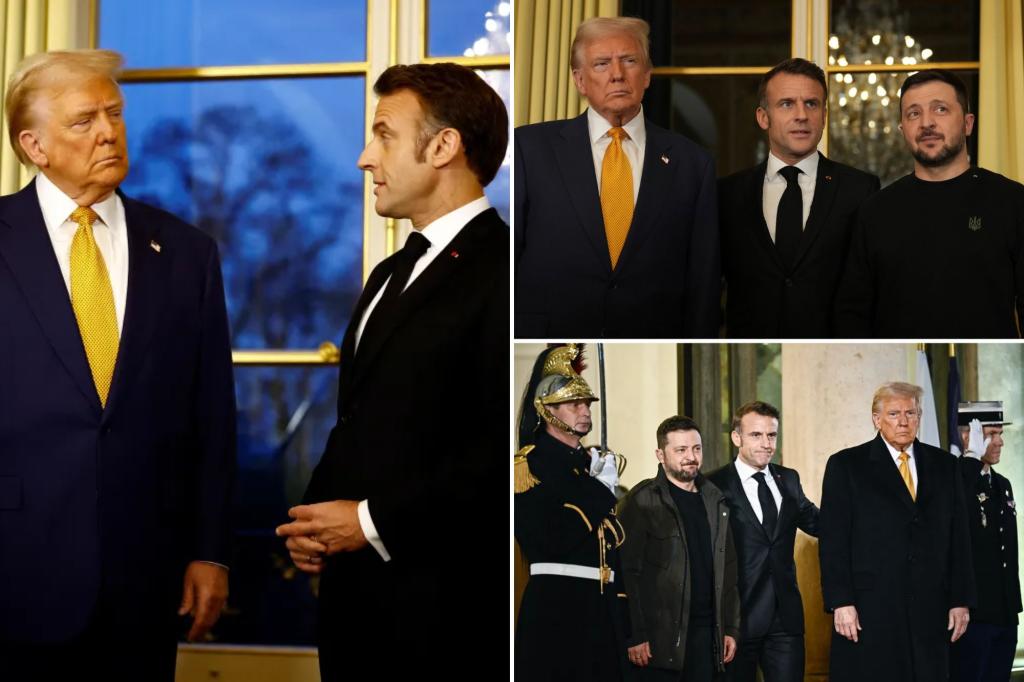The unexpected trilateral meeting between US President-elect Donald Trump, French President Emmanuel Macron, and Ukrainian President Volodymyr Zelensky on the sidelines of the Notre Dame Cathedral reopening ceremony in Paris has sparked significant interest and speculation. This encounter, the first face-to-face between Trump and Zelensky since the former’s electoral victory, signifies a crucial juncture in the evolving dynamics of international relations, particularly concerning the ongoing war in Ukraine and the future of US foreign policy. The meeting’s backdrop, the resurrected Notre Dame, a symbol of resilience and historical continuity, adds a layer of symbolism to the discussions surrounding the war-torn nation of Ukraine.
The optics of the meeting, captured in photographs showing Macron’s reassuring gesture towards a seated Zelensky and a seemingly impassive Trump, hint at the underlying tensions and contrasting approaches to the Ukrainian conflict. Macron’s invitation to Trump for the cathedral’s reopening, despite past strains in their relationship, suggests a strategic effort to engage the incoming US president on critical global issues. The image of Macron mediating between Zelensky and Trump underscores France’s role as a key player in European diplomacy and its commitment to finding a resolution to the Ukrainian crisis. While Trump publicly lauded Macron’s efforts in restoring Notre Dame, the underlying political currents surrounding the trilateral meeting suggest a more complex interplay of interests and priorities.
Trump’s campaign rhetoric regarding the Ukraine war, promising a swift resolution through a forced peace agreement, has raised concerns among European leaders and Ukraine itself. His assertion that he could end the conflict “in one day” due to Kyiv’s dependence on US weaponry has been met with skepticism, given the intricate geopolitical realities and the ongoing Russian aggression. The apprehension stems from a fear that Trump might prioritize a rapid peace deal, potentially at the expense of Ukraine’s sovereignty and territorial integrity, in order to fulfill a campaign promise. European leaders, including Macron and Zelensky, are keen to persuade Trump to maintain US support for Ukraine and pursue a resolution that favors Kyiv’s interests and respects international law.
The timing of this meeting, shortly after a Ukrainian delegation’s visit to Washington for talks with Trump’s incoming national security advisor and special envoy to Ukraine and Russia, emphasizes the urgency of the situation and the importance of transatlantic cooperation in addressing the conflict. These discussions aim to shape the incoming administration’s approach to the war and explore potential pathways towards a peaceful settlement. The Ukrainian delegation’s engagement with Trump’s appointees signifies a proactive attempt by Kyiv to influence US policy and secure continued support in its fight against Russian aggression.
The backdrop of Trump’s first term, marked by strained relationships with European leaders and disagreements over NATO funding and climate change, adds another layer of complexity to the current scenario. His “America First” approach and skepticism towards international alliances have created uncertainty about the future of US foreign policy and its commitment to transatlantic partnerships. European leaders are now faced with the challenge of navigating this complex terrain and finding common ground with the incoming administration to address shared global challenges, including the Ukrainian crisis. The Notre Dame meeting provides a platform for these discussions and an opportunity to rebuild trust and cooperation.
In essence, the trilateral meeting at the Notre Dame reopening represents a critical juncture in international relations. It highlights the complex interplay of interests and priorities surrounding the Ukraine war and the challenges of transatlantic cooperation in a changing geopolitical landscape. The meeting’s symbolism, the contrasting approaches of the leaders involved, and the backdrop of Trump’s past foreign policy stances all contribute to the significance of this encounter and its potential implications for the future of Ukraine and the broader international order. The discussions held during this meeting, and the subsequent actions taken by the involved parties, will undoubtedly shape the course of events in the coming months and years. The world is watching closely, hoping for a resolution to the Ukrainian conflict that respects international law and ensures lasting peace and stability in the region.

